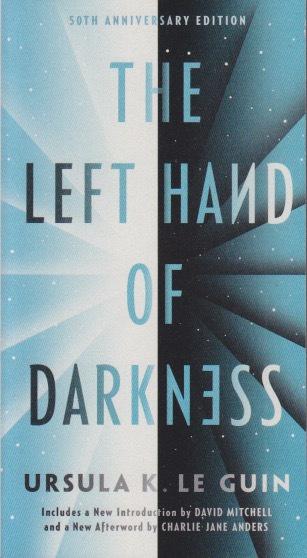
I perhaps have nothing new to say about Ursula K. Le Guin’s The Left Hand of Darkness. It was published before I was ten, and although I grew up reading science fiction I really didn’t read any of Le Guin’s work until this year. It wasn’t intentional—in a small town you read what you can get your hands on, and cover art designed to attract young boys often worked on me. Now having read it, I’m left in a reflective mood. Everyone, of course, comments on the gender aspect of the novel. I guess I’ll be forgiven for doing so as well. After all, it is the most striking feature of the story. As we know from our lives on earth, gender affects pretty much everything about our lives. The biological imperative is strong. It’s no less strong in Left Hand of Darkness, but it is different.
In case you’re like me and haven’t read it (until now), it’s not a spoiler to indicate that it is the story of a male envoy to a planet where the people (and only large mammals) are genderless until once a month they enter “kemmering” when one becomes temporarily male and another temporarily female. The genders aren’t fixed, but fluid. Since the kemmering stage comes only once a month, during that time it become an urgent need among those experiencing it. The novel isn’t about only that, of course, but it is the noteworthy feature that relates to the religion and daily life of the inhabitants of the planet Winter.
It might seem that this idea of shifting genders is itself science fiction, but it is not. There are species on earth that change change gender, bringing into question the statement taken for universal that “male and female he made them.” While gender seems to be evolution’s solution of choice for reproduction, that’s not universal either. In other words, nature provides us with multiple ways in which plants, animals, and things in-between, can continue their existence on this planet. The writers of the Bible weren’t great observers of nature, nor were they scientifically minded. At a glance it looks like animals all conform to the model presented by Genesis. In reality, the world is much more complex than that. Religions aren’t always as comfortable with complexity as writers of science fiction tend to be. Left Hand of Darkness is fine world-building and provocative at that. This may be nothing new, but it is worth pondering again.
